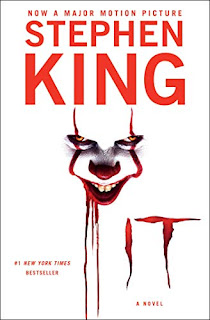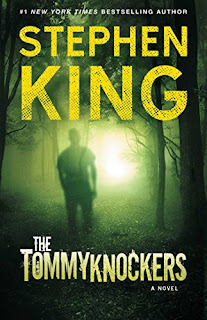Cell
Published: 24, January 2006
Author: Stephen King
Genre: Action, Adventure, Apocalyptic, Classic, Fiction, Horror, Literature, Media Tie-In, Murder, Psychic, Suspense, Technothriller, Thriller, Zombie
Check the summary of this book here:
The Review
Stephen King's Cell is a post-apocalyptic zombie horror book. The plot revolves around a New England artist who is attempting to reunite with his young kid after a strange signal transmitted over the global mobile phone network transforms the bulk of his fellow humans into mindless savage beasts or zombies. This novel contains and also has the potential to promote technophobia in persons who already have a fear of technology.
The screenplay was written by Stephen King himself, and he modified a few things for the film, so I can't put the differences on anybody else, but it wasn't a poor adaptation in my opinion, just not as detailed as a book can be, so watch it after reading the book, or vice versa.
The film is only adequate, and it is not as horrible as many people believe; I would classify it as an above-average zombie film with a technological twist and it is watchable even by those who are not lovers of zombie films.
We follow a group of unaffected 'normies' as they try to do what characters in zombie flicks do: figure out what's going on, go after those they care about, and survive.
When compared to the general fiction industry, Cell is a solid thriller. There are some extremely dramatic and scary moments, particularly the destruction in the immediate aftermath of the Pulse and the phoners' strange conduct as the Pulse's effects intensify.
However, when compared to previous Stephen King novels, it was not awful, but some people may not enjoy it because of the pacing and other events, but for me and many other fans, it will be like a mix between The Stand and The Road.
The post-apocalyptic novel has already been done by King, and it's difficult to imagine how you could match 'The Stand' as a scary character-based thriller in such a context.
Cell required such treatment to function, with lengthy backstories and layers of information to show us how the world has evolved.
I kept expecting to be set up for a parody on contemporary technologies and their impact on our culture.
What could be more obvious than turning Smartphone users into aggressive, gibbering idiots? Instead, King moved towards the manner of 'The Road,' a minimalist work in which mood is more essential than telling a great plot. The cellphone ends up being nothing more than a zombie-creating instrument.
This novel is basically The Stand, The Road, a little bit of 28 Days Later, several zombie movies, and a lot of King's superb knack for crafting a wonderful narrative all combined together.
As usual, King's distinctive depiction of human connection and realistic, one-of-a-kind, daily speech make it a short, simple, and enjoyable read.
I was immensely delighted, but Cell has so many of the classic King themes prevalent in his past works that we end up with a somewhat predictable story of what happens when practically everyone on the globe turns insane save for a select few.
By predictable, I mean King's telepathic addiction, dreams coming true, young teens with adult wit and sophistication, and the main character being a writer or artist.
Make no mistake, Cell is written with Stephen King's wonderful ability to weave an intense, violent thriller that keeps you turning the pages, so regardless of what anyone thinks, it is still a terrific book if you know how Stephen King writes.
I'm a huge admirer of George Romero. I'm also a great fan of Richard Matheson. To my view, the greatest that both have made represents some of the craziest, spookiest material ever, and if industry ever gets its game together to film I Am Legend correctly, it will be a massive box office success.
Having said that, Stephen King's book, Cell, is dedicated to both men, which is understandable.
The first half of the book is a great experience. It's similar to The Stand, but without the religious overtones. The survivors are on the road in an attempt to locate one of their group's youngsters.
That's the basic setup. There's a lot that comes from that simple concept, and it's rather captivating. The Stand became trimmer and tougher somewhere along the road.
He's shed some of the baggage that came with his Dark Tower series, which could have easily been reduced into two solid volumes instead of seven lengthy ones for certain non-readers or casual readers.
In my perspective, he can write anything and still have readers buy and read it, which is why he can write as long and as much as he wants, which I don't mind because I am also turning into him.
What I mean is that he didn't go wild and overwrite this narrative into a thousand-page tome; instead, he kept it brief for his standards, and I was still going to adore it even if it was a gigantic book.
This is another of his apocalyptic stories, and I know many of the people I know and see would not have lasted a moment in the world he's constructed.
The fact that mobile phones transmit the problem hits it home. I think what he did with the not-so-clear explanation and not concentrating on the science of this stuff was a brilliant move, since he left it up to the readers to figure out what and why it happened.
I have an idea, but describing it here would ruin the tale and take away the enjoyment for the readers. I am open to inquiries and will respond if someone wishes to discuss or ask me what I think about it.
Final Thoughts
I know individuals who despise Cell, but I'm sure I'm not the only one that likes it! And the reasons are simple: I love post-apocalyptic fiction, the raw emotion poured out on the page, and zombie-related stuff, plus it shows the reality of the mindless masses that are just glued to their screens and are turning into shells of themselves who are basically blind to everything that is going on around them.
The characters right down to Rafe the cat, have a genuine aspect about them that makes you care about them.
Reading about Alice will undoubtedly make you feel something, but I can't explain what because of spoilers.
The ending, for me, is mixed with both hope and, since I don't want to use the other word, I'll use hope again because I selected the good things and happiness above the sadness, but it was all left up to the reader to decide, as with many works by Stephen King and other creative authors like him.
I believe it's a terrific book, and it does a great job of having you wonder what the hell is going on at moments.
Even though I stated that it is a zombie narrative, it is not your typical zombie apocalypse story; the story and world-building are unique and wonderfully done!
The adventure was fantastic, and the characters, particularly Alice and Jordan, were superb.
The finale was not what I had expected, not that I knew what it would be, but I had a few notions of where it would go in general.
Even if the finale wasn't great, it wasn't terrible either. It was just what it was. Excellent book, which I would strongly suggest to everyone who enjoys reading.
Synopsis
“From international bestseller Stephen King, a high-concept, ingenious and terrifying story about the mayhem unleashed when a pulse from a mysterious source transforms all cell phone users into homicidal maniacs.
There’s a reason cell rhymes with hell.
On October 1, God is in His heaven, the stock market stands at 10,140, most of the planes are on time, and Clayton Riddell, an artist from Maine, is almost bouncing up Boylston Street in Boston. He’s just landed a comic book deal that might finally enable him to support his family by making art instead of teaching it. He’s already picked up a small (but expensive!) gift for his long-suffering wife, and he knows just what he’ll get for his boy Johnny. Why not a little treat for himself? Clay’s feeling good about the future.
That changes in a hurry. The cause of the devastation is a phenomenon that will come to be known as The Pulse, and the delivery method is a cell phone. Everyone’s cell phone. Clay and the few desperate survivors who join him suddenly find themselves in the pitch-black night of civilization’s darkest age, surrounded by chaos, carnage, and a human horde that has been reduced to its basest nature...and then begins to evolve.
There’s really no escaping this nightmare. But for Clay, an arrow points home to Maine, and as he and his fellow refugees make their harrowing journey north they begin to see crude signs confirming their direction. A promise, perhaps. Or a threat...
There are 193 million cell phones in the United States alone. Who doesn’t have one? Stephen King’s utterly gripping, gory, and fascinating novel doesn’t just ask the question “Can you hear me now?” It answers it with a vengeance.”
Useful Search Related Words & Keywords
Brian Witten, Cell Phone, Character Development, Clayton Riddell, Dark Tower, George Romero, Isabelle Fuhrman, Richard Saperstein, John Cusack, Living Dead, Main Characters, Michael Benaroya, Page Turner, Raggedy Man, Salems Lot, Samuel L. Jackson, Shara Kay, Tod Williams, Tower Series, Viacom
Rating: 90/100
Recommended: 95/100 Yes.
Buy the Kindle Version Here
Free With Free Audible Trial
Cell (2016) (R)
Bag of Bones Season 1 (2012) (13+)
Dolores Claiborne (1995) (R)
It (1990) (R)
It (2017) (R)
It Chapter Two (2019) (R)
Needful Things (1993) (R)
Desperation (2006) (16+)
Silver Bullet (1985) (R)
The Tommyknockers (1993) (M)
Christine (1983) (R)
The Dead Zone (1983) (R)
Misery (1990) (R)
Carrie (1976) (R)
Firestarter (1984) (R)
Mr. Mercedes Season 01 (2017) (TV-MA)
Thinner (1996) (R)
The Running Man (1987) (R)
The Dark Half (1993) (R)
The Green Mile (1999) (16+)
Salem’s Lot (1979) (G)
Salem’s Lot: The Miniseries (2004) (NR)
The Dark Tower 8 Book Boxed Set (Paperback)
The Dark Tower (2017) (PG-13)
Compare Kindle E-readers on one page
- - - - - - - - - - - - - - - - - - - - - - - - - - - - - - - - - -
Any kind of support, even a simple 'like, thumbs up or a small comment' is enough and helps me grow, create and freely do more stuff and work on projects for the benefit of many.
Buy me a coffee: https://www.buymeacoffee.com/namsu
Help me grow into a global force: https://www.patreon.com/namsu
Support with crypto coins/tokens: https://cointr.ee/namsu
- - - - - - - - - - - - - - - - - - - - - - - - - - - - - - - - - -












